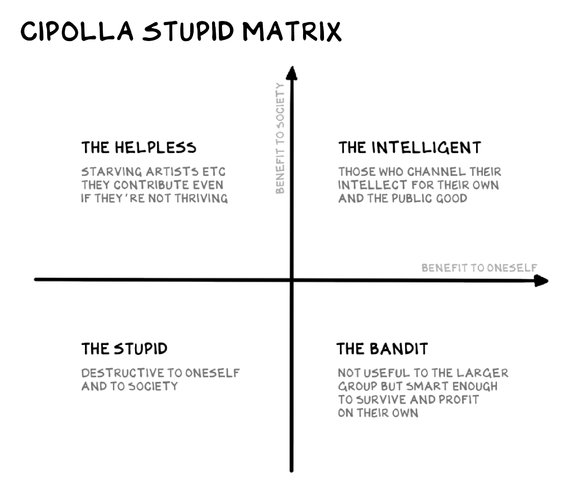- Joined
- Jul 18, 1998
- Messages
- 24,420
- Reaction score
- 52,239
Offline
Good article, my first time reading about these but apparently it’s quite well known
============================
In 1976, a professor of economic history at the University of California, Berkeley published an essay outlining the fundamental laws of a force he perceived as humanity’s greatest existential threat: Stupidity.
Stupid people, Carlo M. Cipolla explained, share several identifying traits: they are abundant, they are irrational, and they cause problems for others without apparent benefit to themselves, thereby lowering society’s total well-being.
There are no defenses against stupidity, argued the Italian-born professor, who died in 2000.
The only way a society can avoid being crushed by the burden of its idiots is if the non-stupid work even harder to offset the losses of their stupid brethren.
Let’s take a look at Cipolla’s five basic laws of human stupidity:
Law 1: Always and inevitably everyone underestimates the number of stupid individuals in circulation.
No matter how many idiots you suspect yourself surrounded by, Cipolla wrote, you are invariably lowballing the total.
This problem is compounded by biased assumptions that certain people are intelligent based on superficial factors like their job, education level, or other traits we believe to be exclusive of stupidity. They aren’t. Which takes us to:
Law 2: The probability that a certain person be stupid is independent of any other characteristic of that person.
Cipolla posits stupidity is a variable that remains constant across all populations. Every category one can imagine—gender, race, nationality, education level, income—possesses a fixed percentage of stupid people.
There are stupid college professors. There are stupid people at Davos and at the UN General Assembly. There are stupid people in every nation on earth.
How numerous are the stupid amongst us? It’s impossible to say. And any guess would almost certainly violate the first law, anyway.
Law 3. A stupid person is a person who causes losses to another person or to a group of persons while himself deriving no gain and even possibly incurring losses.
Cipolla called this one the Golden Law of stupidity. A stupid person, according to the economist, is one who causes problems for others without any clear benefit to himself.
The uncle unable to stop himself from posting fake news articles to Facebook? Stupid.
The customer service representative who keeps you on the phone for an hour, hangs up on you twice, and somehow still manages to screw up your account? Stupid.
This law also introduces three other phenotypes that Cipolla says co-exist alongside stupidity.
First there is the intelligent person, whose actions benefit both himself and others.
Then there is the bandit, who benefits himself at others’ expense.
And lastly there is the helpless person, whose actions enrich others at his own expense. Cipolla imagined the four types along a graph, like this:

The non-stupid are a flawed and inconsistent bunch. Sometimes we act intelligently, sometimes we are selfish bandits, sometimes we act helplessly and are taken advantage of by others, and sometimes we’re a bit of both. The stupid, in comparison, are paragons of consistency, acting at all times with unyielding idiocy.
However, consistent stupidity is the only consistent thing about the stupid. This is what makes stupid people so dangerous. Cipolla explains:

 qz.com
qz.com
============================
In 1976, a professor of economic history at the University of California, Berkeley published an essay outlining the fundamental laws of a force he perceived as humanity’s greatest existential threat: Stupidity.
Stupid people, Carlo M. Cipolla explained, share several identifying traits: they are abundant, they are irrational, and they cause problems for others without apparent benefit to themselves, thereby lowering society’s total well-being.
There are no defenses against stupidity, argued the Italian-born professor, who died in 2000.
The only way a society can avoid being crushed by the burden of its idiots is if the non-stupid work even harder to offset the losses of their stupid brethren.
Let’s take a look at Cipolla’s five basic laws of human stupidity:
Law 1: Always and inevitably everyone underestimates the number of stupid individuals in circulation.
No matter how many idiots you suspect yourself surrounded by, Cipolla wrote, you are invariably lowballing the total.
This problem is compounded by biased assumptions that certain people are intelligent based on superficial factors like their job, education level, or other traits we believe to be exclusive of stupidity. They aren’t. Which takes us to:
Law 2: The probability that a certain person be stupid is independent of any other characteristic of that person.
Cipolla posits stupidity is a variable that remains constant across all populations. Every category one can imagine—gender, race, nationality, education level, income—possesses a fixed percentage of stupid people.
There are stupid college professors. There are stupid people at Davos and at the UN General Assembly. There are stupid people in every nation on earth.
How numerous are the stupid amongst us? It’s impossible to say. And any guess would almost certainly violate the first law, anyway.
Law 3. A stupid person is a person who causes losses to another person or to a group of persons while himself deriving no gain and even possibly incurring losses.
Cipolla called this one the Golden Law of stupidity. A stupid person, according to the economist, is one who causes problems for others without any clear benefit to himself.
The uncle unable to stop himself from posting fake news articles to Facebook? Stupid.
The customer service representative who keeps you on the phone for an hour, hangs up on you twice, and somehow still manages to screw up your account? Stupid.
This law also introduces three other phenotypes that Cipolla says co-exist alongside stupidity.
First there is the intelligent person, whose actions benefit both himself and others.
Then there is the bandit, who benefits himself at others’ expense.
And lastly there is the helpless person, whose actions enrich others at his own expense. Cipolla imagined the four types along a graph, like this:

The non-stupid are a flawed and inconsistent bunch. Sometimes we act intelligently, sometimes we are selfish bandits, sometimes we act helplessly and are taken advantage of by others, and sometimes we’re a bit of both. The stupid, in comparison, are paragons of consistency, acting at all times with unyielding idiocy.
However, consistent stupidity is the only consistent thing about the stupid. This is what makes stupid people so dangerous. Cipolla explains:
Essentially stupid people are dangerous and damaging because reasonable people find it difficult to imagine and understand unreasonable behavior. An intelligent person may understand the logic of a bandit. The bandit’s actions follow a pattern of rationality: nasty rationality, if you like, but still rationality. The bandit wants a plus on his account. Since he is not intelligent enough to devise ways of obtaining the plus as well as providing you with a plus, he will produce his plus by causing a minus to appear on your account. All this is bad, but it is rational and if you are rational you can predict it. You can foresee a bandit’s actions, his nasty maneuvres and ugly aspirations and often can build up your defenses.
All of which leads us to………With a stupid person all this is absolutely impossible as explained by the Third Basic Law. A stupid creature will harass you for no reason, for no advantage, without any plan or scheme and at the most improbable times and places. You have no rational way of telling if and when and how and why the stupid creature attacks. When confronted with a stupid individual you are completely at his mercy.

The five universal laws of human stupidity
We underestimate the stupid, and we do so at our own peril.
 qz.com
qz.com
